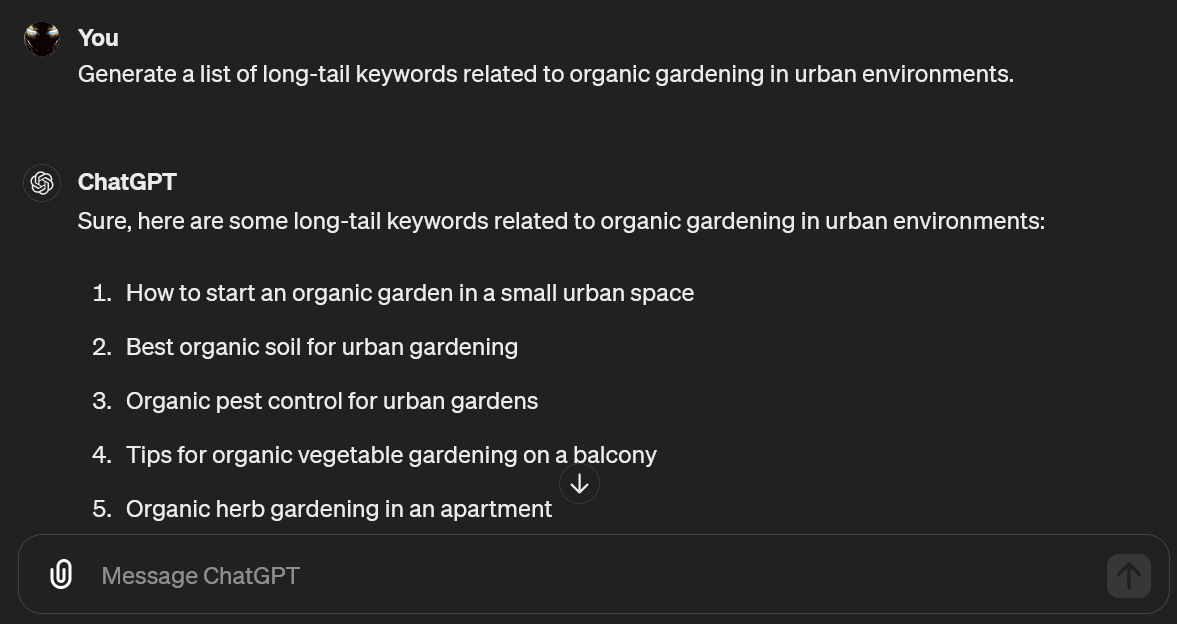Last Updated on May 14, 2024
Keyword research remains a cornerstone of successful Search Engine Optimization (SEO) and digital marketing strategies. While Google has come a long way from a keyword-centric search engine, keywords remain one of the most important ranking factors.
In 2024, generative AI will be at the center stage, especially since the inception of ChatGPT. Hence, it is only obvious, that the SEO community was quick to capitalize on the uses of this AI tool for all sorts. Using ChatGPT for keyword research is beneficial for identifying and analyzing words and phrases that people use in search engines, guiding content creators in optimizing their pages to match user intent. Still, you will need a much more planned approach toward keyword research if your ultimate goal is to enhance online visibility and attract more relevant website traffic.
In this guide, we explore how to use ChatGPT for SEO keyword research.

What is ChatGPT?
A powerful language model developed by OpenAI, ChatGPT can process and generate human-like text based on the input it receives. This capability makes it an invaluable tool for creating content and aiding in complex tasks like keyword research. By understanding the nuances of language and context that ChatGPT handles, marketers and SEO professionals can uncover a wealth of relevant keywords that traditional tools might overlook.
Let’s begin by understanding the foundational elements of keyword research and its significance in digital marketing strategies.
Understanding Keyword Research
Keyword research identifies words and phrases people use to search for information online. These keywords form the basis of content strategy and SEO, enabling websites to rank higher in search engine results pages (SERPs). The relevance of keyword research in SEO cannot be overstated—it directly impacts a website’s visibility and accessibility to its target audience. According to a study by Moz, keywords form the backbone of SEO, influencing every SEO task from content optimization to link building and from market research to understanding user behavior.
Effective keyword research ensures that a business aligns its content with what its audience is actively searching for, thereby increasing the likelihood of attracting targeted, high-intent traffic. A survey by HubSpot revealed that 60% of marketers state that inbound (SEO, blog content) is their highest quality source of leads, highlighting the importance of targeted keyword use.
Basic Steps in Keyword Research
The process of keyword research can be broken down into several critical steps:
Identifying Your Niche:
Understand the core topics and services your business offers.
Analyze market needs and the specific language your potential customers use.
Understanding Search Intent:
Classify search queries according to the intent—informational, navigational, transactional, or commercial investigation.
This classification helps tailor content to meet users’ specific needs and behaviors.
Tools for Keyword Research:
Traditional tools like Google Keyword Planner, Ahrefs, and SEMrush are essential in discovering and evaluating keyword opportunities. These tools provide insights into keyword volume, competition, and trends.
For instance, Ahrefs reports that its Keywords Explorer tool updates its database with over 7 billion keywords and 673 million domains every month, offering extensive data for comprehensive keyword analysis.
By mastering these foundational steps, marketers can create a more informed content strategy that resonates with their audience and drives traffic. However, the emergence of AI tools like ChatGPT offers a new dimension to this task, providing an innovative approach to generating and refining keyword lists based on conversational AI insights.
Introduction to Capabilities of ChatGPT
ChatGPT, developed by OpenAI, is an advanced language-processing AI model designed to understand and generate human-like text based on the input it receives. This AI model can interpret complex language, provide detailed responses, and generate coherent and contextually relevant content across various topics. What sets ChatGPT apart in keyword research is its ability to process vast amounts of textual data and its natural language understanding and generation proficiency.
The model is particularly effective in generating creative content, brainstorming ideas, and suggesting related topics and keywords that might not surface in traditional keyword research tools. This makes ChatGPT an excellent tool for discovering long-tail keywords and niche-specific phrases that are often less competitive but highly targeted, potentially leading to better SEO outcomes.
Advantages of Using ChatGPT for Keyword Research
Leveraging ChatGPT for keyword research offers several distinct advantages:
Speed and Efficiency: ChatGPT can generate multiple keyword ideas quickly, reducing the time researchers spend on initial data collection and brainstorming sessions.
Depth and Relevance: The AI can dive deep into specific niches, providing a broader array of keywords based on extensive language models trained on diverse data sources.
Contextual Understanding: Unlike basic keyword tools that rely on search volume and competition data, ChatGPT can understand the context surrounding keywords, offering insights into how different terms can be used effectively within content.
For instance, in a pilot study by a digital marketing agency, using ChatGPT for keyword generation led to a 30% increase in organic traffic for their clients by targeting underutilized, contextually rich long-tail keywords that traditional tools had overlooked.
By incorporating ChatGPT into the keyword research process, SEO professionals can expand their keyword lists and enhance the precision with which they target specific search intents, leading to more effective and user-focused content strategies.
How to Use ChatGPT for Keyword Research
To begin using ChatGPT for keyword research, you first need access to the platform, which can be via the OpenAI API or through platforms that integrate AI tools.
You can sign up or log into ChatGPT by visiting this link.
Please note that ChatGPT offers free and paid subscription models. The difference lies in the Machine Learning and AI models. While the free plan is based on the GPT-3.5 model, paid plans allow users to use more advanced and accurate ChatGPT-4 and GPT-4o models.
Starting your keyword research with ChatGPT is as simple as typing this prompt: “Generate a list of long-tail keywords related to organic gardening in urban environments.”
Here’s the result:

But you need more than this crude approach.
Step-by-Step Guide to Using ChatGPT for Keyword Research
Using ChatGPT for keyword research can be broken down into a systematic process:
Creating Initial Keyword Lists:
Start with seed keywords related to your niche.
Prompt ChatGPT to expand these into related keywords, synonyms, and variations.
Expanding Keyword Lists:
Ask ChatGPT for questions people might ask about a topic, related topics, or trends, which can provide additional keyword opportunities.
Use prompts like, “What are some common questions about vegan baking?”
Using ChatGPT to Understand Keyword Context and Usage:
Inquire how different keywords are used in a sentence or a specific context, aiding in understanding the user intent behind the keywords.
Example query: “Show me examples of how ‘sustainable fashion brands’ can be used in blog articles.”
Refining Keywords:
With a list of potential keywords, use ChatGPT to help sort and prioritize these based on factors like assumed search intent, niche applicability, and content fit.
This can be a manual process, but asking for AI’s relevance and contextual use input can provide valuable insights.
Using ChatGPT to Analyze Competitor Keyword Strategy
Another effective way to utilize ChatGPT in your SEO strategy is by analyzing competitors’ keyword usage. This involves:
Prompting ChatGPT to simulate potential keyword strategies based on competitor content analysis.
Asking for breakdowns of how competitors might be achieving success with certain keywords or topics.
Refining Keywords with ChatGPT
Finally, refining the keywords involves evaluating the list based on specific criteria like search volume, competition, and relevance. ChatGPT can assist by categorizing keywords or suggesting which might be more effective based on current SEO trends and data.
Tips and Best Practices
Optimizing interactions with ChatGPT can significantly enhance the quality of keyword research and overall SEO efforts. Here are some essential tips and best practices for effectively using ChatGPT in your keyword research strategy.
Optimizing ChatGPT Interactions
Be Specific with Prompts:
The precision of your prompts directly affects the relevance of ChatGPT’s responses. For instance, instead of asking for “keywords related to fitness,” specify “long-tail keywords for beginner home workouts for women.”
This specificity helps narrow the context and provides more targeted and useful keyword suggestions.
Iterative Prompting:
Don’t hesitate to refine and repeat your prompts based on the initial responses. Iterative prompting can help delve deeper into topics and uncover more nuanced keywords.
For example, after receiving the initial list of keywords, you might follow up with, “Can you provide more detailed variations of these keywords focused on the winter season?”
Utilize Diverse Query Forms:
Experiment with different types of questions and prompts to see which yields the most useful results. These can include asking for synonyms, related search queries, or even counterintuitive approaches that might reveal less obvious keywords.
Understand and Leverage the Model’s Limitations:
Recognize that while ChatGPT is powerful, it operates based on patterns in data it has been trained on and may not have access to real-time search volume or trend data. Complement its suggestions with insights from dedicated SEO tools for comprehensive research.
Integrating Other Tools
While ChatGPT is a robust tool for generating creative keyword ideas, integrating its outputs with traditional keyword research tools can provide a more holistic view of keyword effectiveness.
Combine AI Insights with Analytics:
Use tools like Google Keyword Planner or Ahrefs to validate and analyze the search volume and competition of keywords suggested by ChatGPT.
This integration allows for a balance between creative keyword discovery and data-driven decision-making.
Feedback Loop:
Implement keywords in your content and monitor performance via analytics tools. Use performance data as feedback to refine your prompts and queries with ChatGPT, creating a feedback loop that continually improves the relevance and effectiveness of your keyword strategy.
Continuous Learning and Adaptation
Stay Updated:
AI and SEO are rapidly evolving fields. Keep yourself updated with the latest capabilities of AI models and changes in search engine algorithms to adapt your keyword research strategy accordingly.
Experiment and Learn:
Regularly test new approaches and hypotheses in keyword research with ChatGPT. Learning from successes and failures will refine your ability to use AI tools effectively.
Conclusion
ChatGPT is a power-generative AI tool for keyword research, but it is not without a learning curve. To fully utilize the transformative potential of ChatGPT for keyword research, you need a strategic approach. From setting up and optimizing interactions to integrating insights with traditional SEO tools, ChatGPT’s ability to generate diverse and contextually rich keyword ideas quickly and efficiently can be used by SEO professionals for significant advancement.
We hope this guide helps you cover the foundational steps of keyword research using ChatGPT and the critical steps for generating and refining keyword lists.

